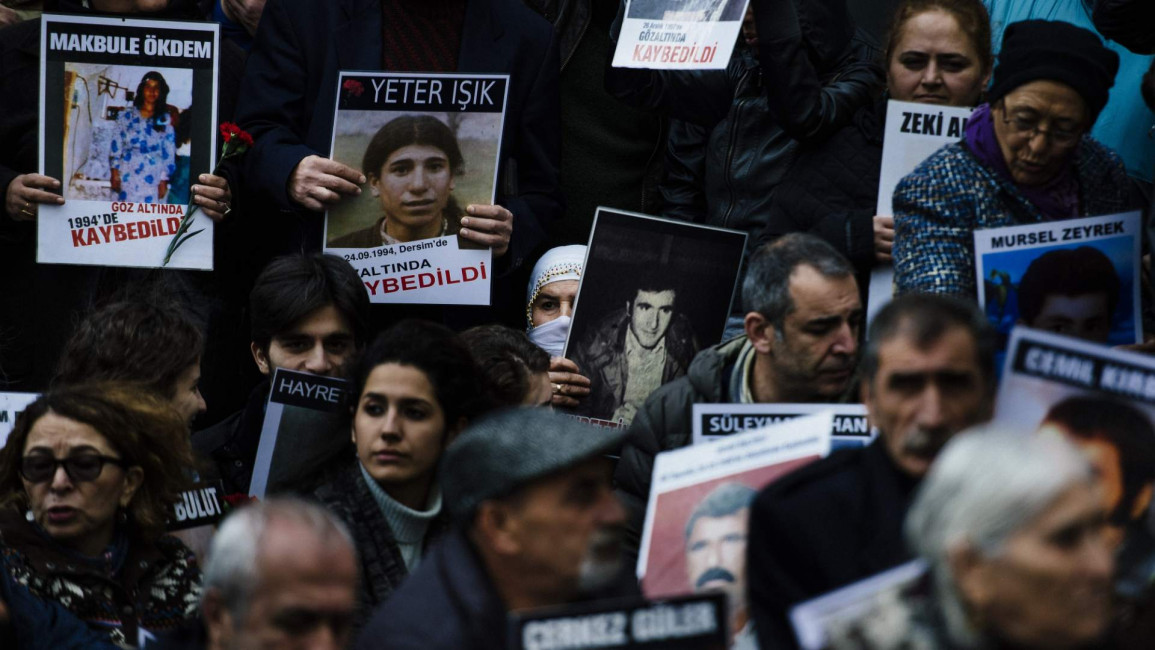Mass grave discovered in southeast Turkey
Mass grave discovered in southeast Turkey
The bodies can likely be traced back to the height of the Turkish-Kurdish conflict, the Human Rights Association said.
2 min read
Hundreds of people were forcibly disappeared during the Kurdish-Turkish conflict [Getty]
A mass grave containing 40 human skills has been found in southeastern Turkey, local media reported.
Irfan Yakut, a resident of the Kurdish-majority province of Mardin, discovered the remains in a cave near Dargecit.
Authorities have since determined the cave contained the bones and skulls of 40 people, who locals suspect were "disappeared" and killed during the height of the Kurdish-Turkish conflict.
Turkish security forces are accused of the enforced disappearance of hundreds of civilians during the conflict.
In Istanbul, the "Saturday Mothers" have protested against the disappearances and called for information about the whereabouts of their relatives - mostly of their sons - every week between 1995 and 1999 and since 2009.
Fevzi Adsiz, head of the local branch of the Human Rights Association, said the organisation believes discovered bones belong to Dargecit locals disappeared and killed by gendarmerie forces.
Yakut's father was among several Dargecit residents disappeared in the early 1990s. He has called for further investigation to determine whether his father's body is among the bones found.
Several mass graves have been found in the Dargecit area over the past decade, one including the remains of a 13-year-old and a 16-year-old.
Follow us on Facebook, Twitter and Instagram to stay connected
Irfan Yakut, a resident of the Kurdish-majority province of Mardin, discovered the remains in a cave near Dargecit.
Authorities have since determined the cave contained the bones and skulls of 40 people, who locals suspect were "disappeared" and killed during the height of the Kurdish-Turkish conflict.
Turkish security forces are accused of the enforced disappearance of hundreds of civilians during the conflict.
In Istanbul, the "Saturday Mothers" have protested against the disappearances and called for information about the whereabouts of their relatives - mostly of their sons - every week between 1995 and 1999 and since 2009.
Fevzi Adsiz, head of the local branch of the Human Rights Association, said the organisation believes discovered bones belong to Dargecit locals disappeared and killed by gendarmerie forces.
Yakut's father was among several Dargecit residents disappeared in the early 1990s. He has called for further investigation to determine whether his father's body is among the bones found.
Several mass graves have been found in the Dargecit area over the past decade, one including the remains of a 13-year-old and a 16-year-old.
Turkey has been fighting a prolonged on-off civil war with the Kurdistan Workers' Party (PKK), a Kurdish separatist organisation, since the early 1980s.
Although Turkey has liberalised the treatment of the Kurdish population in some ways since current President Recep Tayyip Erdogan rose to power nearly 20 years ago, the past six years have witnessed a severe deterioration in relations, with many Kurdish-majority towns subject to months-long curfews and military campaigns and pro-Kurdish politicians dismissed and jailed.






 Follow the Middle East's top stories in English at The New Arab on Google News
Follow the Middle East's top stories in English at The New Arab on Google News
![At least 400 Palestinians have been killed in north Gaza in Israel's over two-week siege [Getty]](/sites/default/files/styles/image_330x185/public/2179471542.jpeg?h=a5f2f23a&itok=usKQc6NU)
![Zammel was handed three 20-month sentences in three cases [Getty]](/sites/default/files/styles/image_330x185/public/2175903251.jpeg?h=cb957c44&itok=rS0fDZb6)
